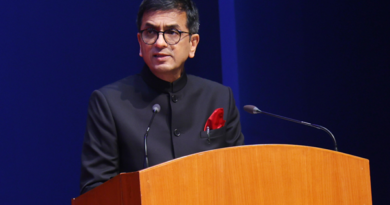The Nature Of Information Sought Is Exempt Under Section 8(1)RTI,Act,2005: Supreme Court Refuses To Disclose Justice Patnaik’s Report To RTI Activist On Larger Conspiracy.
(Judicial Quest News Network)
In the matter of Suo-Motu Writ Petition (C) NO. 1/2019 in re matter of great public importance touching upon the independence of judiciary –
An RTI querry was filed by a freelance Journalist Saurav Das on 23-02-2021, which was refused by the Supreme Court Additional Registrar /CPIO.
It was stated in the Application that The Ld. CPIO is requested to take in carefully consider the below orders of the Hon’ble Central Information Commission CIC/LS/A/2011/000166/BS/0555 before furnishing the reply. A copy of the order is also attached. In the said order, the CIC had held that after the enactment of the Right to Information (RTI) Act, no public authority can escape disclosure of information by deciding to keep records in sealed cover. Since the RTI Act does not have any provision to exempt information from disclosure merely on the ground that it is in a sealed cover, the public authority cannot choose to deny such information. Therefore, if the desired information is kept in a sealed cover and it is not otherwise.
The applicant had sought the information under RTI, the details of a report submitted by former SC judge, Justice A.K Patnaik, on the probe into the ‘LARGER CONSPIRACY’ behind the sexual harassment allegations leveled against the then Chief Justice of India Ranjan Gogoi.
Supreme Court Registry said in response to the RTI query that The Nature of Information Sought Is Exempt under Section 8(1) (B), (1) And Section 11 (1) Of the Right to Information Act, 2005.
In 2019 a Suo Moto case was taken up by Supreme Court against Justice Ranjan Gogoi in the wake of sexual harassment allegations that surfaced against the was titled aas “matter of great public importance Touching Upon the Independence of Judiciary “the court had ordered an enquiry constituted a panel headed by former Supreme Court Judge Justice AK Patnaik, the report submitted by the panel opined that a conspiracy behind sexual harassment allegations cannot be ruled out and it also surmised that certain tough stances taken by ex-CJI GOGOI during his tenure could have triggered the allegations.
It was also mentioned in the report that an IB input was cited in which it is said that several persons were unhappy with Justice Gogoi for driving the Assam-NHRC process.
The Panel had said that “the veracity of the allegations leveled by lawyer Utsav Singh Bains could not be verified completely due to the limited access of records and other collaborative material
In this back drop the case was closed.
The RTI application had sought disclosure of the report.
After the enactment of the Right to Information (RTI) Act, no public authority can escape disclosure of information by deciding to keep records in sealed cover. Since the Act does not have any provision to exempt information from disclosure merely on the ground that it is in a sealed cover, the public authority cannot choose to deny such information. In other words, if the desired information is kept in a sealed cover and it is not otherwise covered by any of the exemption provisions, then it must be disclosed after opening the cover.
He also had referred to a decision of the Central Information Commission in KK Agnihotri V. Ministry of Communication & IT, where it was held “the desired information is kept in a sealed cover and it is not otherwise covered by any of the exemption provisions, then it must be disclosed after opening the cover.
The reason of rejection mentioned in the refusal letter by Supreme Court is that the Das was not a party to the judicial proceedings further the information with respect to any judicial matter may be sought only by moving an application under the Supreme Court Rules 2013.




